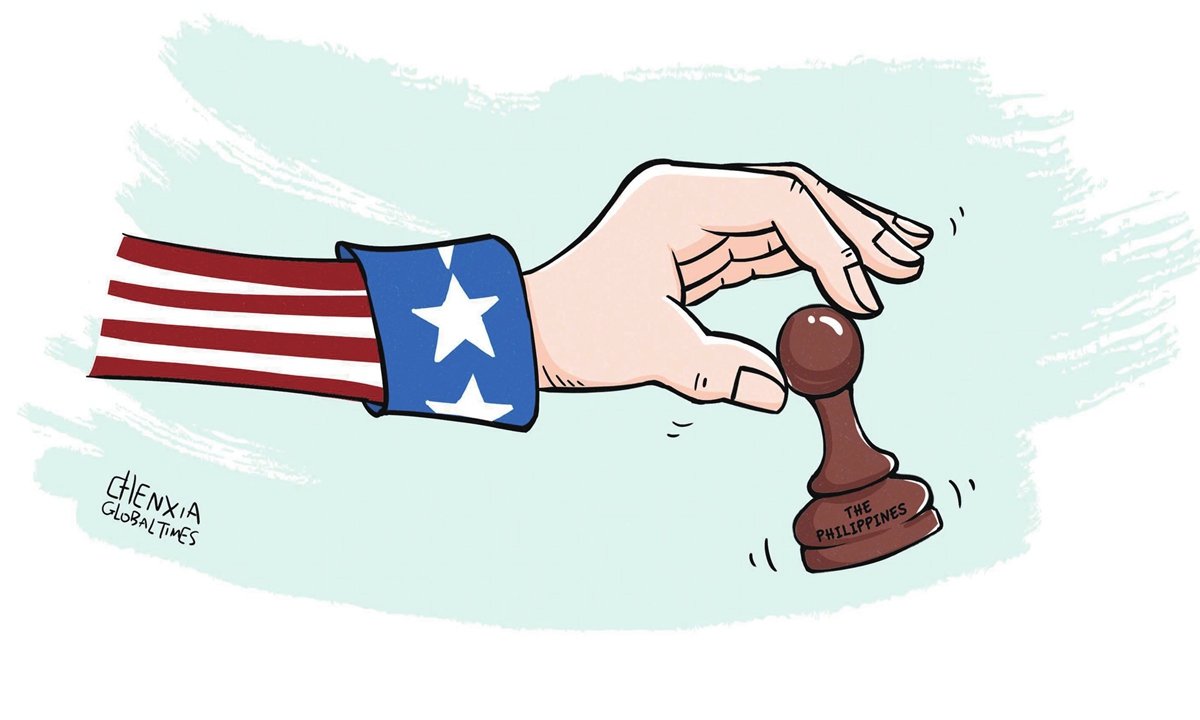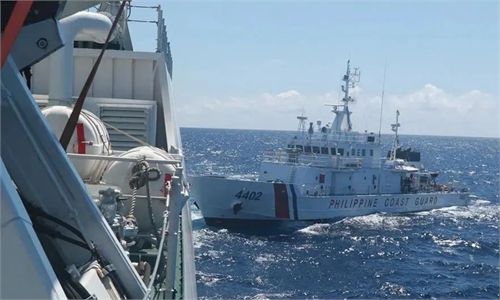Calmness and rationality are what Manila needs most right now: Global Times editorial

Illustration: Chen Xia/GT
After the recent illegal trespassing by Philippine resupply vessels into waters adjacent to Ren'ai Jiao was responded by China Coast Guard's legitimate act to defend its rights, the Philippines has been continuing to make and even escalate unfounded countercharges.
The Philippines will implement countermeasures against "illegal, coercive, aggressive, and dangerous attacks" by China Coast Guard, Philippine President Ferdinand Marcos Jr said on Thursday, adding that he has been in communication with "friends in the international community" and "will not be cowed into silence, submission, or subservience."
The Philippine Department of National Defense (DND) on Friday stated that Filipinos do not yield, accusing the "patronizing" Chinese government of being unable to conduct open, transparent, and legal negotiations.
This logic of "I am right because I am the weak side" is familiar, and carries a hint of coercion. The issues surrounding Ren'ai Jiao, Huangyan Dao, and recently Tiexian Jiao are clear-cut, with China having indisputable sovereignty over the South China Sea islands and their surrounding waters, which is supported on historical and legal grounds. The escalation of tensions since the beginning of last year ultimately stems from the Philippines repeatedly breaking promises and taking provocative actions. China's actions are reasonable, legal, and necessary to defend its rights.
However, when these actions are twisted by Manila, they are carefully woven into a narrative of "big country bullying small country" and portraying themselves as victims.
Furthermore, given the so-called support from the US and its allies for their own purposes, Manila has tasted the sweetness of the self-pity rhetoric, and has become narcissistic and cocky. On the one hand, the US and some of US allies' "sympathy" and "support" have fueled their inner resistance against a stronger opponent, clouding their judgment and increasing their provocative and risky behavior.
On the other hand, Manila fantasizes about using the "international support" they have received to emotionally blackmail China and force concessions from it. Blaming and even threatening the other party under the guise of biased support is simply another form of coercion.
Whether it is for their own purposes or external instigation, the mixture of nationalistic sentiments and manipulated emotions has put the Philippines in a very dangerous position.
As is well known, the South China Sea issue is a highly inflammable matter of nationalist sentiment within the Philippines. Continuously hyping up the South China Sea issue may yield short-term gains in domestic support or serve the interests of those favoring a pro-American and anti-China stance, but it easily leads to self-inflicted harm. Allowing negative sentiments toward China to ferment domestically in the Philippines severely limits the options and actions of Philippine decision-makers regarding the South China Sea issue, resulting in a situation in which they can only resort to constant displays of strength and provocation, making it difficult to make rational adjustments. This obviously does not serve the national interests of the Philippines.
Now, it seems the so-called ironclad support will prove unreliable. Currently, Washington has made many verbal promises to Manila, which is pushing it further on the South China Sea issue. Next, a US-Japan-Philippines summit will soon be held in Washington, and Manila is also inclined to leverage its recent performance to raise its demands in Washington. However, Manila should also be aware that Washington's promises are grand but cheap. It is clear that Washington will not fight a war for the Philippines in the South China Sea. If it comes to a day when conflict is sparked accidentally, it will be Manila that suffers losses.
It is necessary to emphasize that the obstacle to a return to dialogue and negotiation between China and the Philippines has always come from the Philippine side. The escalation of tensions in the South China Sea is not something that countries cherishing regional peace and stability would like to see. Therefore, it is necessary for all parties to exercise restraint. Historical experience tells us that similar friction between China and the Philippines has occurred before, and the key lies in how to handle it properly. The Meiji Jiao incident in 1995 and the Huangyan Dao standoff in 2012 were both cooled down through negotiations and solemn diplomatic representations, proving the importance of resolving issues through dialogue and communication.
China is the largest trading partner of the Philippines, and long-term stability in the South China Sea region is most in line with the common interests of both countries. China has always exercised great restraint and patience toward the Philippines.
Now, the most important thing is for the Philippines to acknowledge the situation, and especially to abandon unrealistic fantasies and exercise self-restraint. This is not "surrendering to China" as some people in the Philippines claim; rather, it is a rational choice based on the national interests of the Philippines. China-Philippines relations are at a critical juncture that urgently requires rationality and sobriety. The Philippines must act with caution on which path to take.

